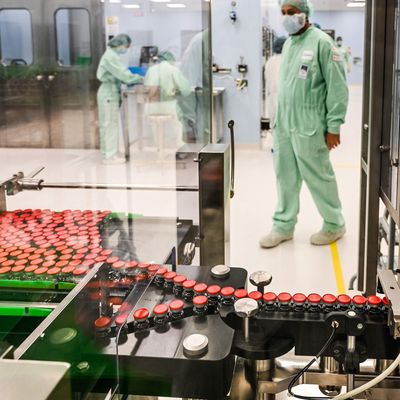
In recent weeks, Pfizer and Moderna announced that their coronavirus vaccines have shown extremely promising results. On Monday, it was AstraZeneca’s turn.
The pharmaceutical giant said on Monday that its vaccine, developed in conjunction with Oxford University, was shown to be as high as 90 percent effective in late-stage trials. And the company’s product has two major advantages over its competitors thus far: It will be cheaper and far easier to store. AstraZeneca’s doses come in at about $2.50 a shot, and require only fridgelike temperatures to remain safe, not colder conditions, as Pfizer’s and Moderna’s do.
Unlike Moderna’s and Pfizer’s vaccines, which use messenger RNA technology, AstraZeneca’s vaccine injects a modified common-cold virus that spurs an immune response if the body detects the coronavirus. When study subjects in Brazil and the U.K. — both of which have seen high levels of COVID in recent months — were given two spaced-out doses, Astra Zeneca’s doses were shown to be 62 percent effective. When given a half-dose followed by a full one, the vaccine was 90 percent effective. Overall, the rate was 70 percent. That number, while lower than Moderna’s and Pfizer’s results, is nonetheless considered a major success. And nobody given the vaccines developed a severe case of COVID-19.
On top of that, this vaccine will be considerably more affordable than its competitors, as the AP reports:
The Oxford-AstraZeneca vaccine is also cheaper. AstraZeneca, which has pledged it won’t make a profit on the vaccine during the pandemic, has reached agreements with governments and international health organizations that put its cost at about $2.50 a dose. Pfizer’s vaccine costs about $20 a dose, while Moderna’s is $15 to $25, based on agreements the companies have struck to supply their vaccines to the U.S. government.
The company says it will quickly seek approval from the World Health Organization to make the vaccine available in poorer countries.






























